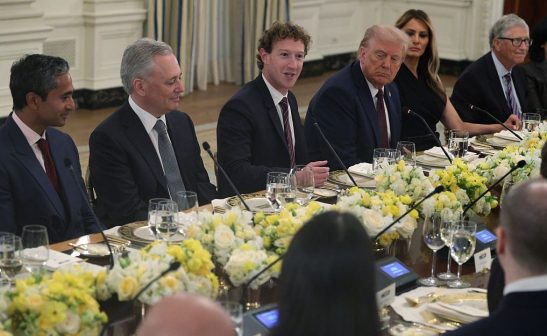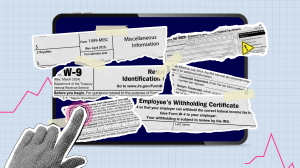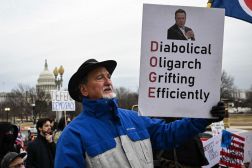“Up-and-coming” is a regular FedScoop feature profiling the rising stars in federal government.
 Sophie Raseman
Sophie RasemanWho?
Sophie Raseman (@raseman)
Director of Smart Disclosure
Treasury Department
What inspires you to work for government?
Above all, I feel fortunate to have the chance to tackle issues that impact people in meaningful ways. It is inspiring to work on how government can innovate to serve the public better. I came into the government in 2009 to work on financial services policy, including what was eventually called the Dodd-Frank Wall Street Reform and Consumer Protection Act, which created the new Consumer Financial Protection Bureau (@CFPB). I now work on smart disclosure, an emerging policy area focused on expanding consumers’ access to machine readable data—all so many innovators outside government can build data-driven products that have a positive impact on consumers’ lives.
Smart disclosure enables the creation of consumer “choice engines,” applications that help consumers make informed decisions, such as picking a college, finding the right mortgage, or figuring out how to cut down on their electricity bills. In some markets, like flight search, many choice engines exist, but in others areas consumers have limited options because data is not easy to access. Through smart disclosure, government helps to facilitate access to machine readable data that can enable the private sector—including entrepreneurs, established companies, and nonprofits—to create a richer array of these tools for consumers.
Over the past few years, I have had the privilege of helping to build the smart disclosure field hand in hand with many inspiring federal government innovators and partners on the outside. There are too many to name here, but Joel Gurin, Senior Consumer Advisor at the FCC, has been a central leader for this work as Chair of the Task Force on Smart Disclosure. We have watched smart disclosure grow from a cutting edge tool to a policy approach that is increasingly becoming embedded into how government does business everywhere from education, to energy, health care, food, finance, safety, transportation, and beyond.
There is a large and growing number of examples of smart disclosure across the federal government. For example, federal agencies have led several initiatives to give individuals access to their own personal data in machine readable formats at the click of a button, so consumers can access an increasing variety of choice engines to help make decisions. Examples of these apps are personalized health dashboards, home energy monitoring apps, and personalized learning tools. These initiatives include “Blue Button” of the Department of Veterans Affairs and Medicare; a response to the White House’s call to action with the “Green Button” (personal energy data); and the Department of Education’s “MyData Button” (educational and student loan data). Federal agencies have also released extensive data on products and services that private innovators can incorporate into choice engines, including data on diverse consumer topics like product recalls, elementary and secondary schools, health insurance, XBRL data on mutual fund fees and other investor information and credit card complaints. An increasing amount of this data is available for bulk download in machine readable formats and through APIs (see Data.gov’s directory of interactive data sets, for example).
What does your typical day look like?
I work in Treasury’s Office of Consumer Policy, where I am the Director of Smart Disclosure, and I also co-chair the Administration’s interagency Task Force on Smart Disclosure, under the National Science and Technology Council. At Treasury, I work on how smart disclosure and choice engines can help consumers make smart financial decisions and take control of their financial lives.
Smart disclosure—and the choice engines that use smart disclosure data—can help consumers in several ways, including by making it much easier to compare different products, access advice on demand, and monitor their complete financial picture. In the financial services domain, choices engines can be thought of as “financial capability tools.” A new generation of such tools are emerging that also have built in coaching and goal-setting features to help people set and stick to their financial goals.
Our office is working to study and catalyze positive innovations in the markets for financial capability tools. For example, we are currently running a prize competition called MyMoneyAppUp (follow on #MyMoneyAppUp). MyMoneyAppUp is a call for ideas and designs for mobile apps that promote financial capability and financial access—including ideas using smart disclosure data. We just announced the winners of the IdeaBank part of the competition.
As the co-chair of the Administration’s interagency Task Force on Smart Disclosure, I am also fortunate enough to work with the White House leaders and dozens of federal agencies and offices on expanding smart disclosure across the federal government. This work is part of the White House’s commitment to expand smart disclosure as part of our National Action Plan on Open Government.
What advice do you have for senior level executives to help them cultivate the next generation of public servants?
One great example of how to empower younger leaders is the White House’s new Presidential Innovation Fellows program, launched on August 23rd. The program pairs accomplished young innovators with federal agencies working on high-priority projects that use innovation and technology to improve the way government does business. We are lucky enough to have a fellow, Nick Bramble, who is joining us to work on smart disclosure, financial capability, and finance data, as part of the fellows’ broader efforts on open data (follow at @ProjectOpenData).
Do you have any mentors? If so, what role have they played in your career?
I am indebted to the dozens of peers, friends, family members, and mentors who have taught, advised, and collaborated with me throughout my education and career. I have been lucky to find many leaders in public service and the private sector who have been generous with their time.
What’s your favorite DC hangout?
I try not to miss the Cherry Blossom Festival.
How do you unwind?
Outdoors, if possible. We’re fortunate at Treasury to be flanked by parks on both sides, so I try to find time to relax in the green space.
Send FedScoop your favorite federal government up-and-comer here.






